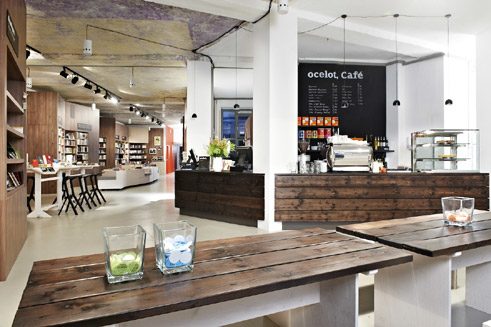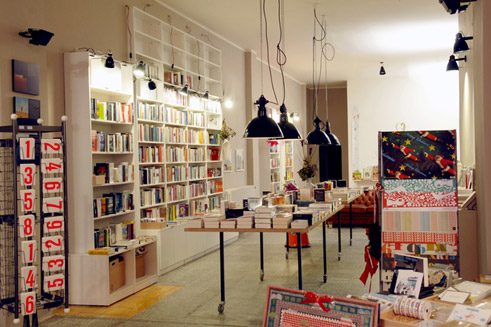Bookshop
Reinventing the Bookshop

Pretty much presumed dead in these times of booming online sales, local bookshops are experiencing a renaissance in major cities. We visited two start-ups in Berlin.
Imagine you are willing to take the odd risk, have considerable business acumen and are keen to make some money by establishing a new venture in Berlin. You are aware that more and more people do their shopping online, and you have carefully tracked the huge success of online businesses like Amazon. Nonetheless, your vision is to open a shop. What product will you decide to sell?
Now imagine if you will the following scenario: you’re sitting at a large black wooden table in a shop in Brunnenstrasse in Berlin’s Mitte district. In front of you is a cappuccino, to your right sits a pile of magazines. The lighting is warm and the mood relaxed – perhaps it’s a bit like sitting in the bar of a plush hotel. It’s your shop, and business is good. So what is it you sell? Books!
As improbable as it may sound, this bookshop actually exists. It’s called Ocelot, opened 18 months ago and is run by Frithjof Klepp, a 38-year-old businessman who, in reply to my somewhat sceptical question, says: “I’m very satisfied, we are seeing strong growth and my idea appears to be working.”
Branding the bookshop
But how can a business idea still work these days that essentially is based simply on selling books in a shop? The number of small bookstores is on the decline: accounting for 57.8 percent of total sales in 2001, their share was down to 48.3 percent in 2012 – that’s more than 15 percent less. Some people claim, as online book retailer Weltbild boss Carel Halff did in an interview with German daily Süddeutsche Zeitung, that the death of the bookshop has only just begun. The market as a whole, says Halff, will shut down at least another 50 percent of its capacities and a comparable number of physical businesses. At the same time, more and more people are buying books online. Internet retailer Amazon has an estimated 20 percent of the German book market – ten years ago its share was a mere 4.5 percent.
And this is precisely why it is crucial to rethink the bookshop concept, says Frithjof Klepp: “Nowadays, a bookshop has to be more than just a place to pick up bestsellers.” Klepp spent nearly a year fine-tuning his business plan, ultimately opting for a combination of four different business strands: a café, a shop, events and his own online store. “We only make any real money with our local book sales, however”, stresses Klepp. All the rest plays an important role above all in defining the bookshop’s core brand.
Ocelot has indeed already become a “brand” and is hailed as a “place-to-be” in the lifestyle sections of the major dailies. From its designer lamps and trendy paper bags to its chic black pencils emblazoned with the Ocelot logo, everything is tailored to create an upmarket shopping experience. “Incidentally, this is a trend that can be seen throughout all branches of industry”, emphasizes Klepp. “Anyone who wants to sell content must focus on the frame within which it is sold.”
Bookshops as cultural centres
Detlef Bluhm is also convinced that the bookshop still has a future in the Amazon era. The director of the Berlin branch of the German Publishers and Booksellers Association, Bluhm, resides in Westend, pretty much at the other end of the city. Nonetheless, he keeps a watchful eye on start-ups like Ocelot. “What I believe is special about them is the way these young bookshop owners realize a particular vision in a highly uncompromising way. In addition, this vision is a lot more about how they themselves would like a bookshop to be rather than about the conventional idea of attracting as diverse a range of customers to their shop as possible.”According to Bluhm, these new types of bookshop see themselves first and foremost as meeting places for like-minded people, as cultural centres that are closely interlinked with the local community. “At the moment, I believe this is a philosophy that is meeting with acceptance.” What is more, the situation in Berlin is in any case somewhat unique, he explains: despite bookshop numbers declining in Germany as a whole, they have not fallen any further here for three years.
Close local networks
 Berliner Buchhandlung Uslar & Rai
| © Markus Schädel
An uncompromising concept and close local networking are two USPs with which Katharina von Uslar can very much identify. She runs a bookshop in Berlin called Uslar & Rai – a year ago, she and the writer Edgar Rai decided to open up a bookshop in the city’s Schönhauser Allee. As von Uslar explains, her motivation for doing so was quite different to that of Frithjof Klepp, who she also knows personally: “We quite consciously chose to open up our shop right now because we believe that our concept will be popular with customers who have very much the same likes and dislikes as we do.”
Berliner Buchhandlung Uslar & Rai
| © Markus Schädel
An uncompromising concept and close local networking are two USPs with which Katharina von Uslar can very much identify. She runs a bookshop in Berlin called Uslar & Rai – a year ago, she and the writer Edgar Rai decided to open up a bookshop in the city’s Schönhauser Allee. As von Uslar explains, her motivation for doing so was quite different to that of Frithjof Klepp, who she also knows personally: “We quite consciously chose to open up our shop right now because we believe that our concept will be popular with customers who have very much the same likes and dislikes as we do.”Katharina von Uslar and Edgar Rai often find readings boring, so they invite people – usually friends of friends – to present their favourite books. “It’s just so fascinating to hear what people like to read and why.” Their range is also intentionally subjective. “Naturally, we cannot entirely ignore bestsellers, nor would we want to. However, I believe that we earn most of our money from people buying books that we also think are good.”
As von Uslar freely admits, all of this can of course only work in the kind of homogeneous environment offered by a big city district such as Berlin’s Prenzlauer Berg. This is particularly obvious, for instance, when it comes to the whole subject of Amazon: “On the one hand, we are clearly profiting considerably from the negative reporting on Amazon that is very much in evidence here in our local area. On the other hand, many of our customers have already been doing their shopping online for years, so it actually feels like something new and exciting to go into a bookshop again for a change and look for a book.”